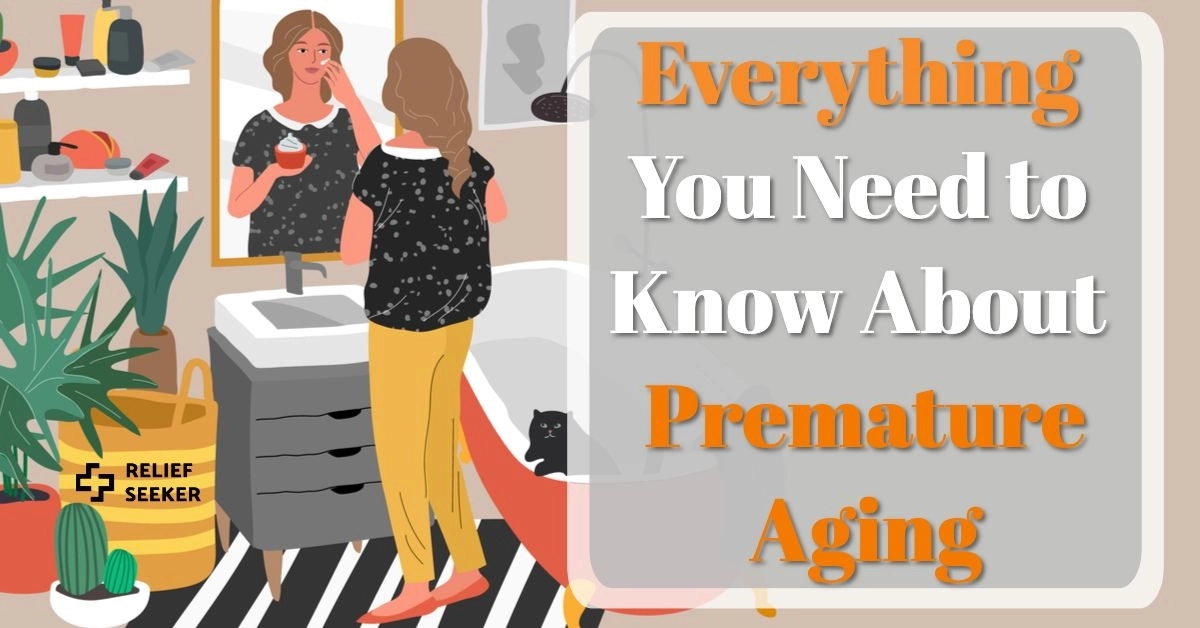Aging is a skin condition that is marked by the appearance of wrinkling and fine lines and usually affects older adults.
On the other hand, premature aging is the presence of premature skin aging, resulting from sun damage, dehydration, hormone imbalances, and other wellness issues. Premature aging can start at any age, though some patients notice the symptoms of this condition as early as their 20s.
Find out how to prevent premature aging and how to treat fine lines, wrinkles, dark spots, and patchy skin if you’re already suffering from this condition.
Premature Aging Symptoms
It’s fairly easy to spot the symptoms of premature aging. We all start noticing the signs of aging when we spot wrinkles, uneven skin, and sagging skin.
It often starts as a laugh line or a frown line here and there. Then before you know it, you start noticing more wrinkled skin, dark spots, and sunken skin (skin that seems to sink into the face instead of plumping out).
The most common signs of premature aging include:
Acne/breakouts
Blackheads
Collagen/elastin loss
Fine lines and wrinkles
Dark spots on the skin
Dry skin
Inflammation
Red spots
Sagging skin
Uneven skin tone
Causes of Premature Aging
The main cause of premature aging is collagen loss. Collagen is the protein our bodies make to help skin cell turnover and repair damaged skin. It gives skin elasticity and that plump, ‘springy’ look that bounces back when we touch it.
As we age, our bodies don’t produce as much collagen as they used to, and they don’t repair collagen cells as easily, either. Without collagen, skin looks saggy, dry, sallow, and gaunt.
There are plenty of risk factors leading to collagen loss, causing premature aging. Just some of the common causes of fine lines, wrinkles, sunspots, melasma, patchy skin, and dark spots on skin include:
Genetics/DNA
Sun exposure
Dehydration
Poor nutrition
Pollution exposure
Stimulants
Insomnia/poor sleep
Hormone imbalances
The good news is that the most common causes of premature aging can be avoided. If you know that premature aging runs in your family, you may want to make some lifestyle changes that reduce your chances of suffering from this skin condition.
Genetics/DNA
The one thing we can’t prevent (usually) when it comes to premature aging is our genetic predisposition to fine lines, wrinkles, dark spots, and patchy skin.
If your parents suffered from premature aging, there’s a good chance that you’ll also suffer from it. But there are two risk factors when it comes to following in your parents’ premature aging footsteps: controllable and uncontrollable factors.
Uncontrollable factors may include the biological reasons you suffer from these skin conditions (you’ve inherited your mother’s dry skin and your father’s rosacea).
Yet, there are also lifestyle factors that you’ll want to take into account too.
In addition to inheriting genetic traits, you probably also inherited your parent’s habits and lifestyle choices too. If your mother had a habit of going into the sun without wearing sunscreen or your father smoked, you may have picked up these negative habits, too.
While you may not be able to control your genes, you can control your lifestyle factors.
Sun Exposure
One of the top causes of most skin conditions is sun exposure.
You’re especially at risk for premature aging if you live closer to the equator, get direct sun exposure, or live in a sunnier climate. If you don’t use protection against the sun, you'll be at an even higher risk for premature aging.
This is also true for people who frequently use tanning beds or sunbathe (for even a few months out of the year).
To add insult to injury, you could be at risk even if you live in an area of the world that doesn’t get much sun exposure each year (such as the Pacific Northwest). Mostly because you’ll still get sun exposure, though you may not be as likely to use sun protection because the sun’s rays don’t feel as intense.
Dehydration
Another big cause of premature aging is dehydration. Our skin needs hydration to stay plump and youthful — and most of that hydration comes from inside our bodies (not moisturizer).
When we are dehydrated, our bodies don’t send any hydration to our skin cells. Meaning, our skin can look dry and flaky, our collagen breaks down more easily, and we see more fine lines, wrinkles, dark spots, and patchy skin.
Dehydration can happen easier in a warm climate. Our bodies need more water to run our internal cooling system. (When we sweat a lot, our bodies lose more water.)
Yet, dehydration can also happen in dry, cold climates too. The dry air can suck the water from our bodies and dehydrate our skin from the outside. (This is why skin may feel itchy and dry in the winter.)
Poor Nutrition
The foods we eat have just as much of an impact on our skin as the products we use. Poor nutrition can lead to dehydration, poor cell turnover, and breakouts.
We already know that hydration is important for skin health, and much of the water that our bodies absorb comes from food (in addition to the water itself).
When we don’t eat fresh fruits and veggies, we often don’t get enough water. Many foods can also have dehydrating effects (foods that contain stimulants, preservatives, or chemicals). When we eat too many of these foods, we can lose what little water our bodies absorb.
Pollution Exposure
Pollution is another major cause of premature aging — and one that’s often ignored. Pollutants in the air can sit on the surface of the skin, clog pores, and lead to skin damage.
Just some pollutants that cause free radical damage include heavy metals, pesticides, carbon dioxide, smoke, and more. Pretty much any pollutant in the air can lead to premature aging over time, and there are not many ways to prevent skin damage. Even if you live in a rural area, you’re likely exposed to some type of pollution.
These pollutants create free radicals that break down collagen or (in some cases) completely destroy collagen.
Stimulants
Stimulants, such as caffeine, sugar, nicotine, alcohol, and drugs can also cause dehydration, leading to premature aging. This is also true for some medications (like ADD and ADHD medication like Adderall).
Stimulants can activate your body’s sympathetic nervous system (your fight-or-flight responses to stressors). When your body goes into this mode, it stops delivering resources to your non-vital organs and systems (such as your skin) and instead reserves resources like hydration for vital systems (such as your cardiovascular and respiratory systems).
Stimulant use can also lead to hormone imbalances (see below), insomnia, and other health issues.
If you’re on prescription medication, it’s important to talk to your doctor before ceasing treatment or searching for alternatives.
Insomnia/Poor Sleep
If you don’t get enough sleep each night (often from insomnia or other issues), your lack of sleep could also lead to premature aging. If you’ve ever woken up from a restless night of sleep with dark circles or bags under your eyes, you already understand the short-term skin effects of insomnia.
Our skin cells turn over at night (meaning they die, shed, and regenerate). If you’re not getting at least seven hours of shut-eye every night (more for some others), your skin won’t be able to regenerate.
Poor sleep habits can lead to clogged pores, hormone imbalances, and dull skin.
Hormone Imbalances
Hormone imbalances can lead to a huge host of health issues (not just skin issues). Our hormones play a major role in most of our bodies’ systems.
Anyone that dealt with acne during puberty (which can last from ages 10 to 17) can attest to how hormones affected their skin. Yet, this isn’t even the tip of the iceberg when talking about the link between hormones and skin.
Hormone imbalances can cause an increase in sebum (the oily, waxy substance that lubricates hairs growing through pores) production. When the body produces too much sebum, it can clog the pores, leading to acne, blackheads, and other skin issues.
Stress
Stress is one of the leading causes of many of the causes of premature aging on this list. It can lead to hormonal imbalances, insomnia, dehydration, and stimulant use.
Stress activates our sympathetic nervous system and prevents our bodies from sending resources to our skin cells. It can prevent us from getting a good night’s sleep and inspire us to use stimulants (such as nicotine, alcohol, and sugar). It can even cause us to forget to use sun protection.
If you can make one lifestyle change that has the biggest impact, it would be stress reduction.
Preventing Premature Aging
If you’re worried about premature aging (especially if fine lines, wrinkles, dark spots, and patchy skin run in your family), you can make some lifestyle changes to prevent premature aging.
Some of the most common ways to prevent premature aging include:
Protecting your skin
Eating healthy foods
Drinking water
Managing stress
Avoiding stimulants
Use Protection
One of the best ways to prevent premature aging is to protect your skin from the sun and pollution.
Use non-chemical sunscreen with a high SPF to prevent pigmentation and skin aging. Protect your entire body from the sun’s ultraviolet rays by wearing long layers and only spending short amounts of time outdoors.
If you live in a dry climate, you may also want to invest in a good moisturizer to help replenish the hydration your skin may lose throughout the day.
To protect your skin from pollution, you’ll want to look for a good moisturizer that creates a barrier between your skin and any pollutants. It’s also important to cleanse your skin at night to ensure you get rid of any free-radical creating pollutants that have landed on your dermis during the day.
Using skincare products with antioxidants and enzymes may also help fight against free radicals (as these ingredients can prevent free radicals from attaching to damaged cells.
Eat and Drink for Your Skin
The foods we eat and the amount of water we drink play such a huge role in our skin’s health. It’s important to eat foods that support the skin (often foods high in vitamin D, E, and C) and have high water content.
The amount of water that you need to drink each day usually depends on your body and lifestyle. Yet, most experts agree that drinking at least eight glasses of water each day is a good place to start.
You’ll also want to avoid any known allergens (dairy, wheat, etc.) as those can cause hormonal imbalances, dry skin, and breakouts too.
Manage Stress
Since stress is one of the main causes of premature aging and can lead to other causes of this condition, you’ll want to manage your stress levels.
Most people know when they’re stressed. The most common symptoms of stress include anxiousness, uncomfortable sensations in the stomach (butterflies), chest, and throat. Stress is essentially a chemical response to dangers (physical, life-threatening, psychological, and emotional).
When we don’t manage these responses, our stress can start taking a physical toll on our bodies.
Talk Therapy
One of the most effective ways to manage stress is through talk therapy. Online therapy platforms like Talkspace can match you with a therapist that specializes in stress reduction techniques.
Make video appointments in real-time or send text, video, or voice messages. Get tips on reducing stress and get insight into why certain situations are causing stress in the first place.
Mindfulness
Mindfulness techniques, like meditation, exercise, and controlled breathing, are known to fight stress and lower the presence of stress hormones (such as adrenaline and cortisol) in your system.
If you’re new to meditation, you may want to download a meditation app. These apps offer mediation instruction as well as guided meditations and tips.
Sleep
Getting eight hours of sleep each night (or more) can help your body regulate stress hormones. If your stress is keeping you up at night, you may want to seek out treatments for insomnia. Online sleep specialists can help you understand the causes of your anxiety and insomnia and prescribe medications to help lull you to sleep while you’re dealing with these causes.
Avoid Stimulants
Avoiding stimulants, such as caffeine, nicotine, alcohol, drugs, and sugar can help reduce dehydration. Stimulant use can also lead to insomnia, hormone imbalances, and other issues that may lead to premature aging.
Doctors recommend that women only consume one alcoholic beverage per day and that men consume less than two.
If you’re suffering from premature aging, you may want to cut back on alcohol consumption altogether. If you think you have problems with drugs or alcohol, contact the SAMHSA National Helpline at 1-800-662-4357 for treatment options.
Get Regular Check-Ups
It’s also important to get regular check-ups at your doctor’s office and/or dermatologist’s office to prevent abnormal aging issues, such as skin cancer. Your doctor can also check for hormone imbalances and other issues leading to premature aging.
You can also order at-home testing kits to determine if issues that lead to premature aging run in your family.
Premature Aging Treatment
If you’re already starting to notice the aging process on your skin, you may want to get treatment to reverse the signs of aging. Most fine lines, wrinkles, dark spots, and hyperpigmentation is reversible.
Treatments range from at-home prescription skincare to in-person (outpatient) treatments to surgical treatments.
Anti-Aging Prescription Skincare
One of the most effective treatments for aging skin is prescription skincare products. These products are formulated for your skin type and contain the exact amount of active ingredients needed to treat your condition (without causing other issues).
Most anti-aging skincare can be prescribed online now, making this treatment even more convenient. Online skincare companies like Dear Brightly, Rory, and Musely hire dermatologists to prescribe Rx strength retinol, anti-aging skincare kits, spot treatments, night creams, and neck and chest treatments.
These at-home treatments are affordable, painless, and effective.
Botox
Another common treatment for fines lines and wrinkles is Botox and fillers. For this treatment, you’ll need to travel to a doctor of dermatology to get injections.
Botox prevents further damage and repairs past damage by paralyzing some facial muscles while fillers actually ‘fill in’ the fine lines and wrinkles on your skin’s surface.
While these treatments are effective, they’re somewhat expensive and painful. They may also lead to other issues such as swelling, pain, droopy eyes, and tearing.
Microdermabrasion
Microdermabrasion and chemical peels simply remove the top (dead) layer of skin cells, allowing and encouraging cell regrowth. This type of service is offered in-person at a dermatologist’s office.
Your dermatologist will use chemicals or tools to remove the top layer of your skin. Depending on the level of severity of your premature aging, this can be somewhat painful and require significant downtime. It may look like you have a severe sunburn for as little as several days and for as long as up to two weeks.
Ideally, this treatment should increase collagen production and allow your skin to grow back with fewer wrinkles.
While this treatment is relatively safe, it’s not always the most convenient.
Laser Resurfacing
Another treatment for premature aging is laser resurfacing. This somewhat newer treatment is only offered in dermatologist offices and uses (you guessed it) lasers to remove a layer of dead skin cells.
This type of treatment is considered extremely safe and precise. Yet, it can also be pretty expensive and only works on minor fine lines, wrinkles, and dull skin.
If you’re worried about premature aging or if premature aging runs in your family, there are plenty of ways to prevent and treat this condition. While genetics play a large role in this skin condition, DNA is only a small cause of fine lines and wrinkles.


